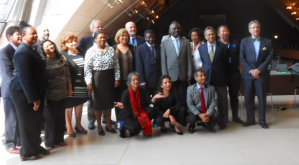GENEVA (21 September 2013) – The United Nations Independent Expert on the promotion of a democratic and equitable international order, Alfred de Zayas, today urged the UN General Assembly to adopt a more decisive role in peace-making and peace-keeping. He also called for a more proactive role for the UN Secretary General in early warning and urgent action by referral of belligerent tension to the General Assembly and to the Human Rights Council.
“The United Nations is the best hope to spare humanity from the barbarity of war, from the senseless death, destruction and dislocation it brings about,” Mr. de Zayas said on International Day of Peace. “It is time for the UN General Assembly, as the most representative world body, to voice the international community’s rejection of war and war-mongering.”
“It is time to reinvigorate the UN General Assembly so that it can exercise a more decisive role in peace-making and peace-keeping, consistent with the will of the international community,” he stressed.
The UN Independent Expert noted that threats to regional and international peace included “the irresponsible war-mongering of sensationalist media that instead of discussing possibilities of negotiated settlements prefer to beat the drums of war and manipulate public opinion in order to make armed intervention plausible and socially acceptable.”
“It is the responsibility of all of us to remind governments of their commitments to settle disputes by peaceful means and to negotiate in good faith under the UN Charter, and to denounce war agitation particularly by the media,” Mr. de Zayas said. “The Secretary General should use his good offices and deploy preventive strategies against the uncontrolled dynamics of war propaganda.”
Besides the commitment of all States to bilateral and multilateral mediation, the expert drew attention to the fact that the UN Charter also contains a clear prohibition of sabre-rattling, of threatening with the use of force, or actually using force, except if authorized by the Security Council.
“Despite this prohibition, recently there have been dangerous moments when the threat of the use of force outside the permitted scope of the UN Charter hung over the world as the sword of Damocles, where an emotional media-hype for war seemed to be dragging the world toward an even graver humanitarian catastrophe,” Mr. de Zayas said.
“Notwithstanding protests in many countries by civil society denouncing the persistent war-mongering by some politicians as illegal, undemocratic, and contrary to international human rights law, the real danger of miscalculation and escalation with unpredictable consequences weighed heavily on humanity,” he added.
The Independent Expert recalled that the UN Human Rights Council is currently discussing a Draft Declaration on the Right to Peace, which recognizes peace not only as a principle but as a human right with collective and individual dimensions, grounded in the Universal Declaration of Human Rights and the core UN human rights treaties. “There is no doubt that human beings want to live in peace, and the holding of world referenda would prove this conclusively,” he said.
“Without peace and the rule of law, civil, cultural, economic, political and social rights cannot be enjoyed, when killing, maiming and mutual poisoning prevail,” Mr. de Zayas underscored. “If we want world peace, we must break the vicious circle of violence and reprisal, of an eye for an eye, of endless hate.”
“Peace is not the silence of cemeteries, but the song of social justice,” concluded the UN Independent Expert on the promotion of a democratic and equitable international order.
Alfred de Zayas (United States of America) was appointed as the first Independent Expert on the promotion of a democratic and equitable international order by the Human Rights Council, effective May 2012. He is currently professor of international law at the Geneva School of Diplomacy. Mr. de Zayas practiced corporate law and family law in New York and Florida. As a Human Rights Council’s mandate holder, he is independent from any government or organization and serves in his individual capacity. Learn more, log on to:http://www.ohchr.org/EN/Issues/IntOrder/Pages/IEInternationalorderIndex.aspx
Check the Independent Expert latest report to the UN Human Rights Council: http://www.ohchr.org/Documents/Issues/IntOrder/A-HRC-24-38_en.pdf
The International Covenant on Civil and Political Rights: http://www.ohchr.org/EN/ProfessionalInterest/Pages/CCPR.aspx
For more information and media requests, please contact Pol Planas (+41 22 9179657 / pplanas@ohchr.org) or write to ie-internationalorder@ohchr.org.
For media inquiries related to other UN independent experts:
Xabier Celaya, UN Human Rights – Media Unit (+ 41 22 917 9383 / xcelaya@ohchr.org)
UN Human Rights, follow us on social media:
Facebook: https://www.facebook.com/unitednationshumanrights
Twitter: http://twitter.com/UNrightswire
Google+ gplus.to/unitednationshumanrights
YouTube: http://www.youtube.com/UNOHCHR
Storify: http://storify.com/UNrightswire
Watch “20 years of human rights – the road ahead”: http://www.youtube.com/watch?v=4XDHX5fkxFg&feature=share&list=UU3L8u5qG07djPUwWo6VQVLA
Related articles
- Put self-determination on UNHRC agenda: Expert (dezayasalfred.wordpress.com)
- UN expert calls for concrete protection to support civil society voices, including ‘whistleblowers’ (dezayasalfred.wordpress.com)
- Whistle-blowers and HRDs serve democratic principles says U.N. expert (dezayasalfred.wordpress.com)
- Alfred de Zayas interviewed about his United Nations (UN) mandate (dezayasalfred.wordpress.com)
- U.N.’s Pillay sets deadline for Sri Lanka probe (thehindu.com)
- Comments by Alfred de Zayas, Independent Expert on the promotion of a democratic and equitable international order, following the Interactive Dialogue on the presentation of his thematic report (dezayasalfred.wordpress.com)


Alfred,
Thank you for being a voice for sanity at this time. It seems sometimes that in the world of academic international relations there is an overestimate of the academic aspect and an underestimate of the spiritual dimension. I believe that any discussion of matters pertaining to war and peace should obviously include the word peace, yet would be truly revelatory when the word love is included. My view is that love has been almost completely overlooked as the solution to war and killing, yet it is the solution. This is the paradox of world leaders’ discussions on international relations, war and peace.
Thank you,
Jerry
LikeLike